Gain insight into the profound moments marked by the 3rd, 6th, and 9th hours in the Bible, unlocking mysteries that resonate through time.
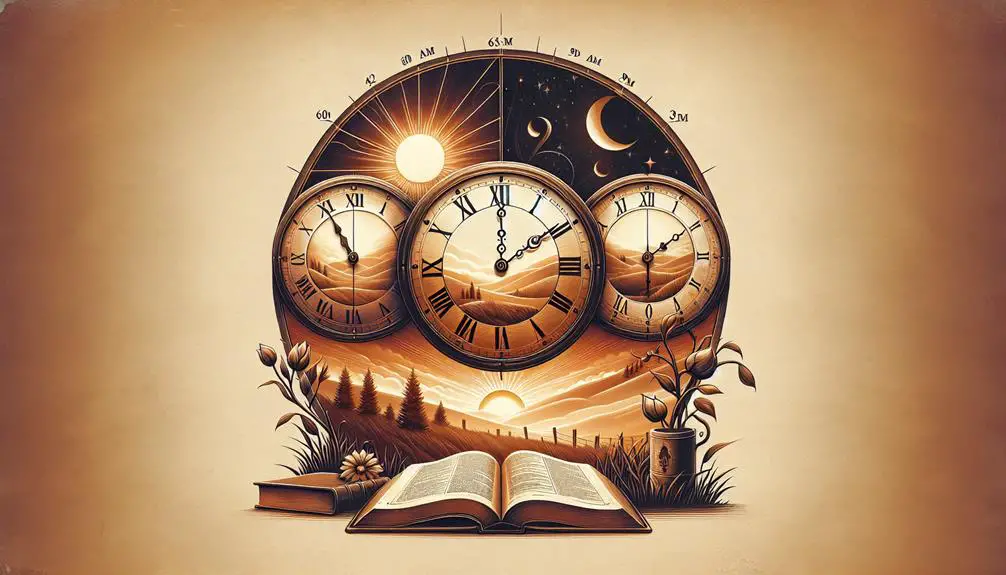
3rd 6th and 9th Hour in the Bible
Navigating through the pages of the Bible is akin to traversing a labyrinth filled with hidden treasures; among these are the mentions of the 3rd, 6th, and 9th hours, each holding its unique significance and mystery.
You'll find that these times are not just markers of the day but pivotal moments that shaped the foundation of Christian beliefs, from the outpouring of the Holy Spirit at Pentecost to the darkness that enveloped the earth at the crucifixion.
As you explore further, you'll uncover how these hours have influenced modern practices and reflections, offering you a deeper connection to these historical moments.
The question then beckons, how do these times speak to us today?
Key Takeaways
- The 3rd hour marks the descent of the Holy Spirit at Pentecost, symbolizing spiritual awakening and the start of apostolic missions.
- At the 6th hour, Jesus' crucifixion and the accompanying darkness represent humanity's sin bearing and a call for reflection on redemption.
- The 9th hour is associated with Jesus' death, signifying the culmination of prophetic fulfillment and encouraging hope for deliverance and new beginnings.
- These hours emphasize the importance of prayer, reflection, and spiritual discipline, integrating biblical events into daily life and spiritual practices.
Historical Context and Significance
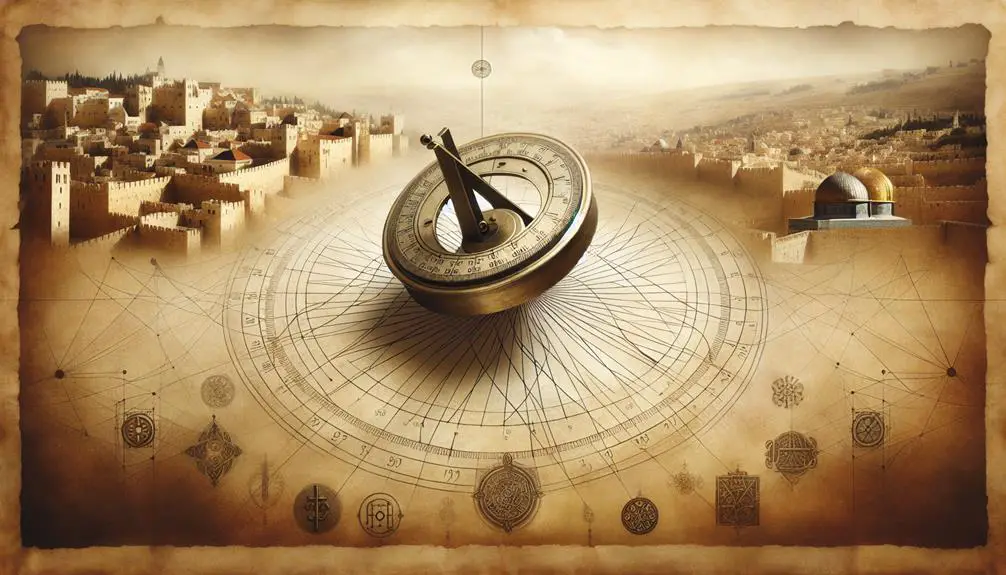
To fully grasp the significance of the 3rd, 6th, and 9th hours in the Bible, it's essential to delve into their historical context, which highlights their profound impact on biblical narratives and religious practices. Understanding these specific times requires a brief foray into ancient Jewish customs and the timekeeping methods that governed daily life.
In the Jewish tradition, the day was divided according to the movement of the sun, starting at sunrise and ending at sunset, which was then further segmented into 12 hours. This division wasn't just a method of timekeeping but deeply intertwined with religious observances and rituals. The 3rd, 6th, and 9th hours, occurring approximately at mid-morning, noon, and mid-afternoon, respectively, held particular significance due to their association with specific prayers and sacrifices outlined in the Torah.
These hours were markers for both communal and individual observances. For instance, the 3rd hour often signified the beginning of the day's major activities, including work and prayer, setting the tone for devoutness and diligence. By the 6th hour, the zenith of the day, there was a pause for reflection, prayer, and, in certain periods, the offering of sacrifices, symbolizing a recommitment to God amidst daily endeavors. The 9th hour, as the day waned, was a time for a final gathering of thoughts and prayers, reinforcing the cycle of devotion and dependence on divine guidance.
These practices underscore the intertwined nature of Jewish customs and timekeeping, where every hour bore a weight beyond the mere passage of time, serving as a constant reminder of faith, community, and the presence of the divine in everyday life.
3rd Hour: Pentecost and Prayer
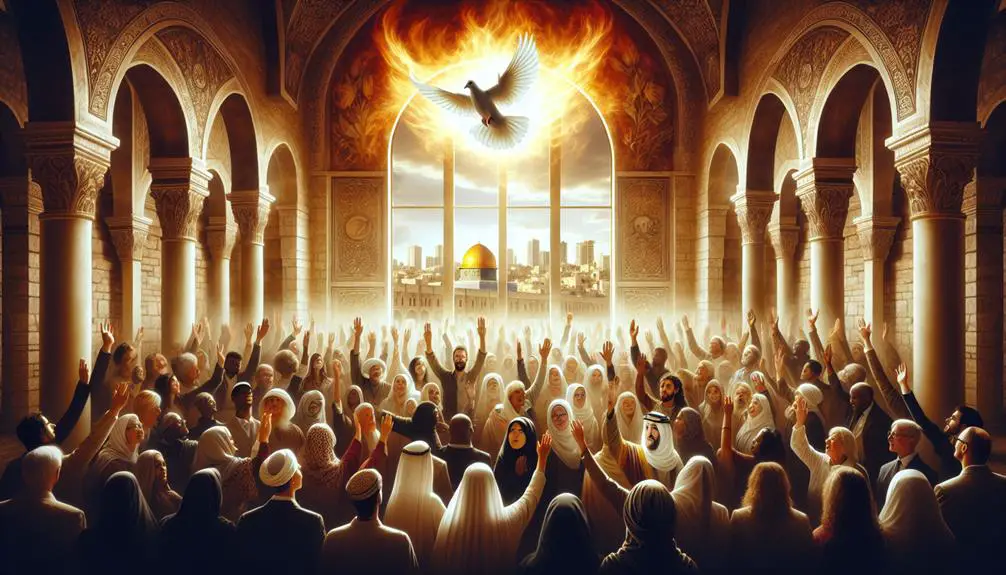
Building on the understanding of ancient Jewish customs and timekeeping, let's examine the 3rd hour's pivotal role during Pentecost and its connection to prayer. The 3rd hour, traditionally observed at around 9 AM, holds significant spiritual implications, particularly highlighted during the Pentecost event. This moment marked not only a fulfillment of prophecy but also the commencement of the Apostolic mission, characterized by a profound spiritual awakening among the disciples and those present.
- Fulfillment of Prophecy: The descent of the Holy Spirit during Pentecost at the 3rd hour was a direct fulfillment of Joel's prophecy, emphasizing the universality of God's promise of spiritual empowerment.
- Commencement of the Apostolic Mission: This hour marked the beginning of the Apostolic mission, as the disciples were emboldened to preach the gospel, transcending language barriers and cultural divisions.
- Symbol of New Beginnings: The 3rd hour signifies a new phase in God's redemptive plan, transitioning from the Old Covenant to the establishment of the Church.
- Spiritual Awakening: The events at Pentecost represent a spiritual awakening, not just for the immediate participants but for all believers, signifying the indwelling of the Holy Spirit.
- Connection to Prayer: This hour's events reinforce the importance of prayer and spiritual readiness, exemplifying how pivotal moments of prayer can lead to significant spiritual breakthroughs and empowerment.
Understanding the 3rd hour in the context of Pentecost and prayer offers insight into its importance in biblical narratives, highlighting themes of spiritual awakening and the initiation of the Apostolic mission.
6th Hour: Crucifixion and Darkness
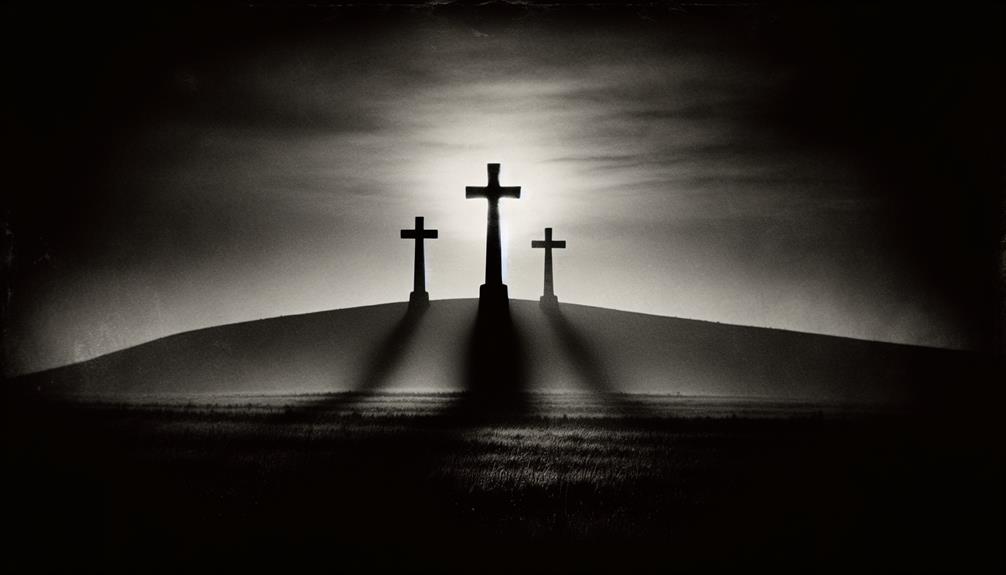
While the 3rd hour marks a moment of divine empowerment, the 9th hour, observed at around 3 PM, bears witness to the profound darkness and pivotal events of the crucifixion, shaping the theological landscape of Christian belief. This moment isn't merely a chronological marker; it's imbued with darkness symbolism and cosmic significance that transcend a simple reading of the events.
The darkness that envelops the earth at the 9th hour isn't just a natural phenomenon; it's a symbolic manifestation of the cosmic upheaval and the gravity of Jesus' sacrifice. This period of darkness serves as a tangible representation of the sin and separation from God that Jesus is bearing on humanity's behalf. The cosmic significance of this event is further underscored by the fact that this isn't an ordinary nightfall but a supernatural occurrence that aligns with Jesus' final moments on the cross.
The impact of this darkness goes beyond its immediate effect; it's a pivotal moment that signals the climax of Jesus' earthly ministry. The darkness, coupled with the crucifixion, acts as a fulcrum, balancing the scales of divine justice and mercy. It's a visual and spiritual sign to all of creation that something extraordinary is taking place – a moment that would redefine humanity's relationship with the divine.
In analyzing the 9th hour, one must delve into the layers of darkness symbolism and cosmic significance. These elements aren't mere backdrops to the crucifixion; they're integral to understanding the depth of what's transpiring. This moment of darkness is a profound theological statement about the nature of sacrifice, redemption, and the transformative power of divine love.
9th Hour: Death and Deliverance
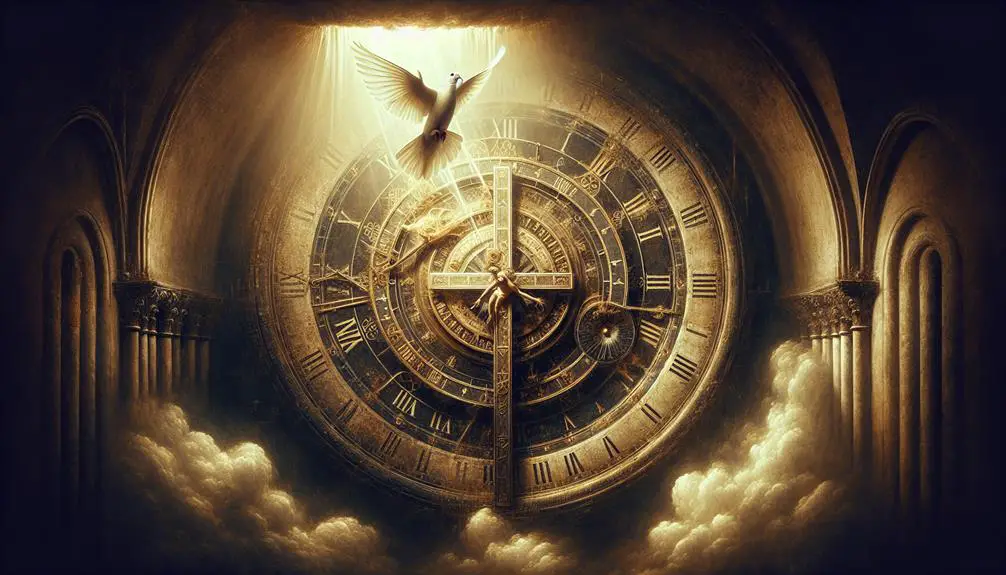
Exploring the profound implications of the 9th hour's darkness, we now turn our attention to the moment of death and deliverance that defines this pivotal hour. This moment, rich in time symbolism and cultural interpretations, invites a deeper understanding of its significance within the biblical narrative and beyond.
- Time Symbolism: The 9th hour marks a transitional period, symbolizing the end of one era and the beginning of another. It's not merely a point in time but a threshold between despair and hope, death and deliverance.
- Cultural Interpretations: Various cultures have imbued this moment with significant meanings, often reflecting themes of sacrifice, redemption, and renewal. This cross-cultural resonance highlights the universal human experience of seeking deliverance through trials.
- Biblical Context: In the Bible, the 9th hour is a culmination of prophetic fulfillment, where the themes of sacrifice and salvation are most poignantly expressed. This hour encapsulates the essence of divine intervention and mercy.
- Theological Implications: This moment carries profound theological implications, offering a lens through which to view the interplay between divine justice and grace. It challenges believers to reflect on the nature of sacrifice, atonement, and redemption.
- Human Experience: Beyond its religious significance, the 9th hour speaks to the universal condition of facing mortality and the quest for meaning in moments of suffering. It embodies the hope for deliverance and the promise of new beginnings.
Through this lens, the 9th hour emerges not only as a key biblical moment but as a timeless symbol of the intersection between human frailty and divine grace, inviting continuous exploration and interpretation.
Modern Reflections and Practices

In today's rapidly evolving spiritual landscape, it's imperative to examine how modern reflections and practices draw from and reinterpret the profound symbolism of the 9th hour. This time, historically marked by Christ's crucifixion, now serves as a foundation for contemporary spiritual discipline and time management. You'll find that many believers integrate the essence of this pivotal hour into their daily lives, seeing it as a call to pause, reflect, and connect with the divine.
This adaptation doesn't merely echo ancient traditions but transforms them, making spiritual practice more accessible in the hustle of modern life. You're encouraged to carve out moments of contemplation and prayer at specific times, mirroring the disciplined schedule of the 3rd, 6th, and 9th hours. This approach not only honors historical spiritual rhythms but also offers a practical framework for embedding spirituality into your daily routine.
Moreover, the emphasis on the 9th hour in contemporary practice underscores the importance of sacrifice and redemption themes in personal growth and spiritual development. It's a reminder that, amidst your busy schedule, finding time for spiritual discipline is both a form of self-sacrifice and a pathway to greater fulfillment and peace.
Frequently Asked Questions
How Do the Interpretations of the 3rd, 6th, and 9th Hours Vary Across Different Christian Denominations?
You'll find that interpretations of these specific hours vary across Christian denominations due to differences in cultural symbolism and historical context.
While analyzing these variances, it's vital to consider how each tradition understands these moments. Some view them as purely symbolic, others as literal historical events with deep theological significance.
This diversity in interpretation enriches the broader Christian discourse, offering a complex mosaic of beliefs that reflect the faith's multifaceted nature.
Are There Specific Prayers or Liturgical Practices Recommended for Believers to Observe During These Hours in Contemporary Times?
You're exploring if there are recommended prayers or practices for certain times today, factoring in time zones and historical accuracy. It's intriguing how these aspects influence modern observances.
While precise recommendations may vary, many traditions uphold specific prayers at these hours, reflecting a deep-rooted historical significance.
Analyzing this, you'll find that the alignment between ancient practices and contemporary observance offers a rich, scholarly insight into the continuity and adaptation of faith across ages.
How Have Artists and Musicians Been Inspired by the Events of the 3rd, 6th, and 9th Hours in Their Works?
You've seen artists turn a blank canvas into a storytelling masterpiece, right? Well, when it comes to painting symbolism, they've often dipped their brushes into the palette of these notable hours, crafting vivid narratives.
The same goes for composers, whose musical compositions echo the profound emotions tied to these moments. Their works aren't just art; they're analytical studies, dissecting and reassembling the essence of these hours into a tapestry of sound and color.
Can the Significance of These Hours Be Found in Any Apocryphal Texts or Non-Canonical Christian Writings?
You're diving into whether apocryphal texts or non-canonical Christian writings capture the significance of specific hours. Indeed, Gnostic interpretations offer a rich tapestry for understanding these moments, albeit with a layer of mythic embellishment that challenges historical accuracy.
In What Ways Have Modern Theologians Challenged or Expanded Upon Traditional Understandings of the Events That Occurred During the 3rd, 6th, and 9th Hours?
You're exploring how modern theologians have revisited the events traditionally associated with these specific times, focusing on historical context and cultural interpretations.
They've delved into how these moments reflect broader societal beliefs and historical realities.
By challenging or broadening traditional views, they've introduced new layers of understanding, highlighting the interplay between ancient texts and contemporary insights.
This analytical approach uncovers nuanced perspectives on these pivotal events, enriching your grasp of their significance.
Conclusion
Interestingly, the biblical hours that once marked moments of profound spiritual turmoil now tick by in our lives largely unnoticed. You rush through the 3rd hour, perhaps ensnared in a morning meeting, oblivious to the Pentecostal fires.
By the 6th, you're likely lamenting over a hurried lunch, far removed from the crucifixion's darkness. And as the 9th hour fades, you might find yourself stuck in evening traffic, distant from any thoughts of deliverance.
In our modern rush, we've ironically lost touch with these pivotal moments, underscoring a profound disconnect from the sacred rhythms that once guided humanity.

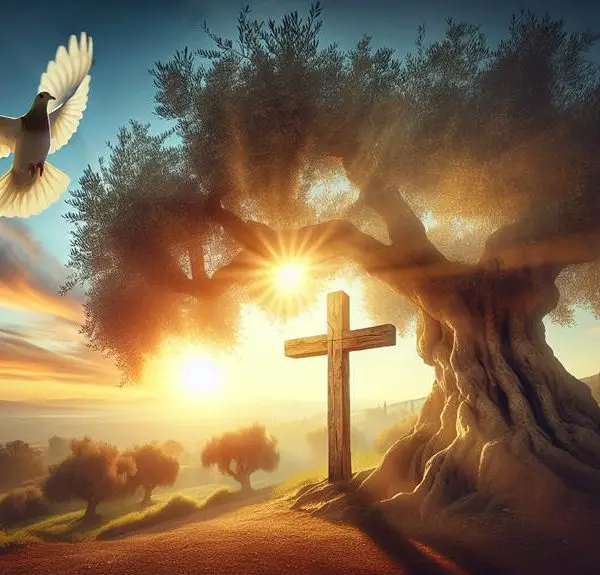
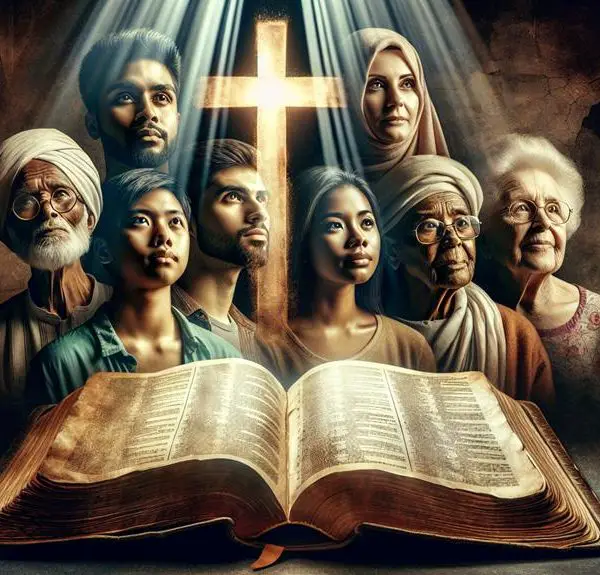
Sign up